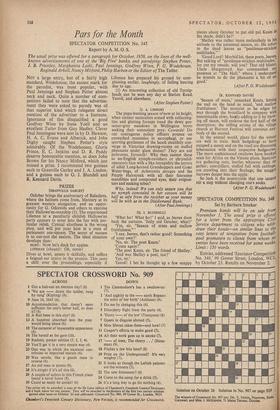Pars for the Month
The usual prize was offered for a paragraph for October, 1956, on the lines of the well- known advertisements of one of the 'Big Five' banks, and parodying: Stephen Potter, J. B. Priestley, Marghanita Laski, Paul Jennings, Godfrey Winn, P. G. Wodehouse, Reginald Arkell, Nancy Milford, Philip Harben or the Editor of The Tatler.
NOT a large entry, but of a fairly high standard. Wodehouse, the easiest mark for the parodist, was most popular, with Paul Jennings and Stephen Potter almost neck and neck. Quite a number of com- petitors failed to note that the advertise- ment they were asked to parody was of that superior kind which relegates direct mention of the advertiser to a footnote. Ignorance of this disqualified a good Godfrey Winn by Irene Yoell and an excellent Taller from Guy Hadley. Clever Paul Jenningses were sent in by D. Hawson, H. A. C. Evans and Alberick, and John Digby caught Stephen Potter's style admirably. Of the Wodehouses, Gloria Prince, E. C. Jenkins and D. R. Peddy deserve honourable mention, as does John Brown for his Nancy Mitford, which just missed a prize. I recommend two guineas each to Granville Garley and J. A. Lindon, and a guinea each to G. J. Blundell and R. Kennard Davis.
PRIZES
(GRANVILLE GARLEY)
October brings the anniversary of Balaclava, where the helmets come from, Mercury at its greatest western elongation, and an oppor- tunity for G. Odoreida and others to exercise their Hallowe'en-manship (1). The experienced Lifeman at a peculiarly childish Hallowe'en party appears to enter into the fun with par- ticular relish. Cynical aloofness is the wrong ploy, and will put your host in a state of permanent one-upness. The secret of success is to out-zest the zealots. The ideal situation develops thus: HOST: Now let's duck for apples. LIFEMAN (shouts): Oh, GOOD!
Dives at bowl, upsets it skilfully, and suffers a feigned ear injury in the process. This casts a chill over the proceedings, especially if
Lifeman has prepared his ground by com- plaining earlier, laughingly, of failing hearing due to age.
(1) An interesting collection of old Turnip- heads can be seen any day at Station Road, Yeovil, and elsewhere.
(After Stephen Potter.)
0. A. LINDON)
The pupa-hunting season is'now at its height, when sinister naturalists armed with collecting- tins and glinting forceps tread the dewy gos- samer-grey meadows in Wellington boots seeking their somnolent prey. Cowards! Do our courageous police officers pounce on enswathed mummies in sarcophagi, or our sporting gentlemen of the heath stealthily con- verge in Victorian drawing-rooms on stuffed pheasants under glass domes? They are not poltroons, forsooth! Why then cannot these so un-English nymph-ravishers or chrysalid- operators face with a like intrepidity the terrors of adult Long-horned Grasshoppers and Great Water-bugs, of Acherontia atropos and the Purple Hairstreak with all their fearsome mandibles and compound eyes, their oviposi- tors and sucking tubes?
Why, indeed! We can only assure you that no nymph concealed in her cocoon will be half as safe from the ravisher as your money will be with us in the Diddlemand Bunk.
(A f ter Paul Jennings.)
(G. I. BLUNDELL)
'What ho! What ho!' I said, as Jeeves drew back the curtains. 'Jolly old October, what?'
'Yes, sir. "Season of mists and mellow fruitfulness." '
'I say, Jeeves, that's rather good! Something of your own?'
'No, sir. The poet Keats.'
'Come again?'
'The poet Keats, sir. The friend of Shelley.' 'And was Shelley a poet, too?'
Yes, sir.'
'Good! I bet he thought up a few snappy
pieces about October to put old pal Keats in the shade, didn't he?'
'Shelley was rather more melancholy in his attitude to the autumnal season, sir. He refers to the dead leaves as "pestilence-stricken multitudes." '
'Good Lord! Morbid lot, these poets, Jeeves. But talking of "pestilence-stricken multitudes, lay out my tweeds, will you? That old blister, Uncle Murgatroyd, has commanded MY presence at The Hall," where I understand he intends to do the pheasants a bit of no good.'
(R. KENNARD DAVIS)
'Season of mists,' remarked Keats, hitting the nail on the head as usual, 'and mellow fruitfulness.' The motorist as he edges his way through the brouillard in company with interminable elms, bulily adding to it by blow' ing off steam, will endorse the first half of the description; the stifling aroma of the village church at Harvest Festival will convince any' body of the second. In the animal world, plans for the winter are well in train. Such hedgehogs as have escaped a messy end on the road are discussing hibernation with. their respective heclgesows. The more sophisticated swallows have booked seats for Africa on the Vienna plane. Squirrels are gathering nuts, beetles whatever they do gather; caterpillars, stuffed full with cabbage, are crawling into their fleabags; the maggot burrows deeper into the apple.
So lush is the countryside that one cannot stir a step without changing one's socks.
(After P. G. Wodehouse.) (After P. G. Wodehouse.)










































 Previous page
Previous page